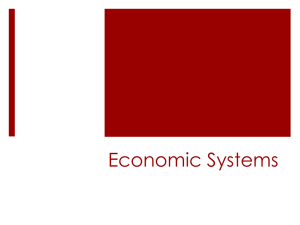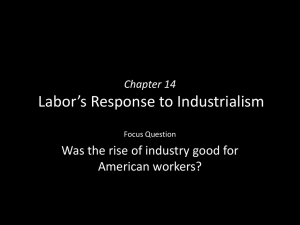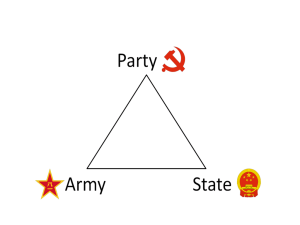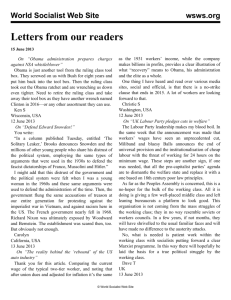The Belgian left and the crisis
advertisement
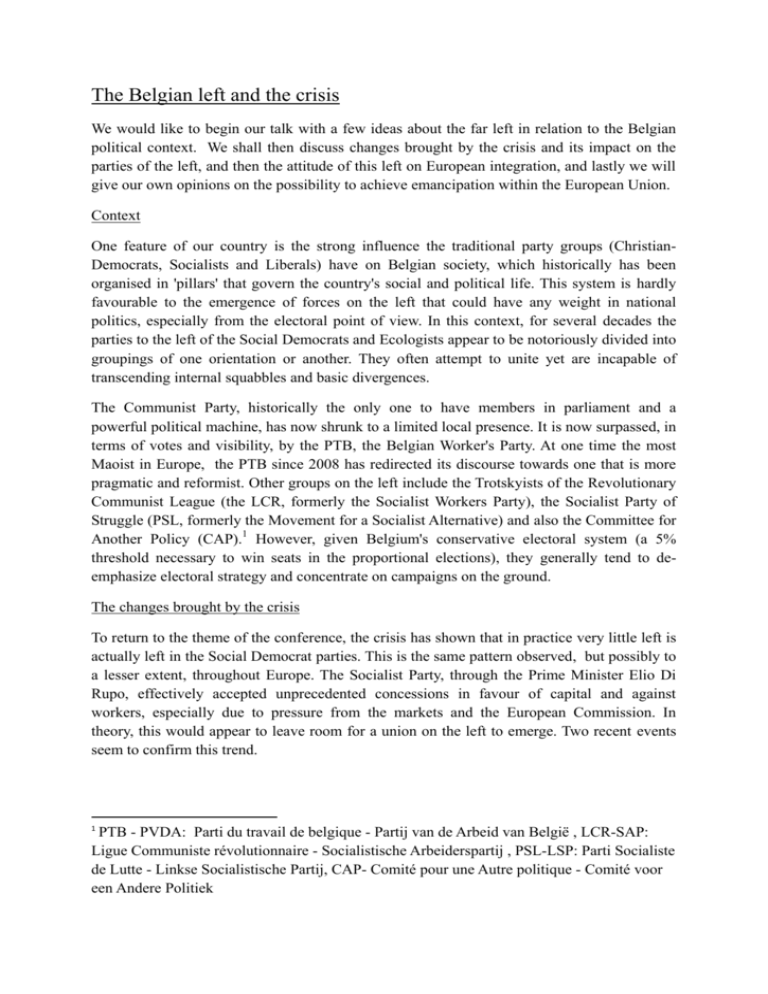
The Belgian left and the crisis We would like to begin our talk with a few ideas about the far left in relation to the Belgian political context. We shall then discuss changes brought by the crisis and its impact on the parties of the left, and then the attitude of this left on European integration, and lastly we will give our own opinions on the possibility to achieve emancipation within the European Union. Context One feature of our country is the strong influence the traditional party groups (ChristianDemocrats, Socialists and Liberals) have on Belgian society, which historically has been organised in 'pillars' that govern the country's social and political life. This system is hardly favourable to the emergence of forces on the left that could have any weight in national politics, especially from the electoral point of view. In this context, for several decades the parties to the left of the Social Democrats and Ecologists appear to be notoriously divided into groupings of one orientation or another. They often attempt to unite yet are incapable of transcending internal squabbles and basic divergences. The Communist Party, historically the only one to have members in parliament and a powerful political machine, has now shrunk to a limited local presence. It is now surpassed, in terms of votes and visibility, by the PTB, the Belgian Worker's Party. At one time the most Maoist in Europe, the PTB since 2008 has redirected its discourse towards one that is more pragmatic and reformist. Other groups on the left include the Trotskyists of the Revolutionary Communist League (the LCR, formerly the Socialist Workers Party), the Socialist Party of Struggle (PSL, formerly the Movement for a Socialist Alternative) and also the Committee for Another Policy (CAP).1 However, given Belgium's conservative electoral system (a 5% threshold necessary to win seats in the proportional elections), they generally tend to deemphasize electoral strategy and concentrate on campaigns on the ground. The changes brought by the crisis To return to the theme of the conference, the crisis has shown that in practice very little left is actually left in the Social Democrat parties. This is the same pattern observed, but possibly to a lesser extent, throughout Europe. The Socialist Party, through the Prime Minister Elio Di Rupo, effectively accepted unprecedented concessions in favour of capital and against workers, especially due to pressure from the markets and the European Commission. In theory, this would appear to leave room for a union on the left to emerge. Two recent events seem to confirm this trend. 1 PTB - PVDA: Parti du travail de belgique - Partij van de Arbeid van België , LCR-SAP: Ligue Communiste révolutionnaire - Socialistische Arbeiderspartij , PSL-LSP: Parti Socialiste de Lutte - Linkse Socialistische Partij, CAP- Comité pour une Autre politique - Comité voor een Andere Politiek On the one hand, the trade unions have changed their attitude towards the government parties. Historically the unions have been close to the political groups cited at the start of this paper. The system is beginning to collapse, however, in particular due to the gradual move of all the parties to neo-Liberalism. For example, the powerful Christian (ACV-CSC) and Socialist (ABVV-FGTB) trade union federations have become increasingly critical of the political parties to which they were always close, and are no longer systematically calling on their members to vote for them. This was particularly evident following the austerity measures decreed by Di Rupo's Socialist government, a notable example being the general strike organised by the country's three main unions early this year. Likewise, during the May 1st ceremonies some Socialist trade federations and congresses were openly critical of the social liberal evolution of the Socialist Party and called for a union of parties to the left of the Social Democrats and Ecologists. Some labour leaders also expressed keen interest in the dynamics of the Left Front during the French presidential elections. We should keep an eye on the attitude of the unions towards the traditional parties in order to see if this will help federate a broader union. Considering the weight of trade unions in Belgium (closely associated in social and employment policies), their support of a possible union of parties would be a considerable advantage. Along the same line, this year we witnessed a few defections within the parliamentary left (Ecologists and Greens), who criticised the leadership's position as too centralist. In Wallonia, for the same reasons, the regional MP Bernard Wesphael left the French-speaking Ecolo party to found the Left Movement, the Belgian equivalent of Jean-Luc Mélanchon's Parti de gauche. In Flanders the left wing of the Socialist sp.a party, who had felt marginalised (as the party has clearly assumed a Blairite orientation), walked out and founded Rood! (Red!). If the series of defections presently appears to be limited, it does illustrate the frustration of some members of the parliamentary left who can no longer identify with the neo-liberal direction taken by their leadership. The left and the EU As regards the left's position and strategy on European issues, we should note that in our traditionally Europhile country, the left generally maintains a highly critical stance towards European integration, but without calling for a return to the (strictly) national level. In the divide between the Eurosceptics - seen as hostile to European integration, and the Eurocritics - seen as favourable to integration yet critical of its current direction, most of the left parties are on the latter side (even if one should not draw hasty conclusions as the small size of these parties indicate a broad ideological heterogeneity in certain groupings). Nevertheless, the theme of Europe has not always been held up as a key mobilising element. The economic crisis and the EU's dominant role in promoting austerity solutions have gradually led most leftist parties and movements to dwell increasingly on the theme of Europe. For example, most parties on the far left remain highly critical of the EU's past and present direction (criticising the anti-democratic nature of the most recent treaties, the inefficiency of neoliberal policies, etc.). At the same time they affirm that the solution lies in an alternative form of European integration and posit that the social struggle must be placed at the European level in order to fight against the Europeanization of the employers' strategies that opt for social and fiscal dumping among Member States in order to weaken the workers. In the programmes, there appears to be a certain consensus among the parties for a European response to the crisis. The debate within the groups on the left, however, is often quite hot as to the choice between a pragmatic and reformist attitude and the more radical stance that stresses criticism of the current policies rather than the formulation of counter-proposals. As regards strategy, we can see that the urgency of the crisis has not fundamentally changed the strategies of the non-parliamentary left. The PTB still rejects the idea of any electoral cartel or alliance that would not carry its name and wishes the parties to unite, but behind them. Nevertheless, attempts to form a union in the far left seems to be gathering more consensus in other parties, including the Flemish and French-speaking Communist Parties (members of the European Left), and the idea is becoming more entrenched. On the occasion of the upcoming local elections in October 2012, almost all the parties of the left, except the PTB, upheld the dynamics of a union. Illustrating the greater place taken by European issues most of the parties on the left organised several meetings in view of the upcoming elections, which included the presence and support of European parties that belonged to the European Left. To a certain extent, this shows both the growing importance of European questions and the willingness to smooth over differences in order to build an alternative. Personal opinion on the question of emancipation within the EU As regards our personal opinion on the possibility to achieve emancipation within the EU, we do not think that the left can have a strategy on economic and social matters that is situated solely at the national level. Indeed, unless leftist measures are drawn up and harmonised at the European level, they run the risk of being ineffective. In our opinion, therefore, the EU is where we should be mobilising ourselves in the aim for social emancipation and solidarity among the people of Europe. This said, in the light of the strongly right-leaning position of the European institutions and the Member States, some emergency measures need to be recommended at the national level. We must also defend the progressive emancipation mechanisms that can be found in various Member States (where they are often attacked by the right and by employers) and promote their application at the European scale. One example is the Belgian mechanism for automatic indexation of salaries, whereby salaries are automatically raised in relation to price increases. Employer groups have always criticised this mechanism and in the past few years it has been a favourite target of the European right, incarnated by the Commission and the German Chancellor Angela Merkel. Promoting it at the European level could be a way to respond to these attacks and also enable the workers of other European countries to benefit from a progressive mechanism to maintain purchasing power, considered in Belgium as a major social acquis. Conclusion In conclusion, there is little prospect for the problems endemic to the Belgian left, division and marginalisation, to be solved in the immediate future. Although the formation of several municipal lists for the October 2012 local elections seems to reflect a certain dynamic towards union, the left is still fragmented into several parties. Although many have called for the left to follow the French example of a left front, this does not mean that they will manage in the long term to smooth over their differences and concentrate on the essential issues. The case of Belgium shows that the growing political hostility towards the traditional political class, and the popular defiance towards the economic system are not enough to foresee the emergence a true movement of the left that can hold sway in politics. For such a dynamics to exist and represent a credible alternative to the parties that have shifted towards neoliberalism, the left will have to overcome its age-old demons of division and converge on the essential issue: to defend workers against the ravages of neoliberal policies and to formulate proposals for audacious and credible alternatives. The left must also adapt its discourse in order to reach an audience beyond a limited number of sympathisers, and to be heard by all those who are disappointed in an economic system that is increasingly authoritarian, with harmful effects that will certainly have an ever stronger impact on people.




